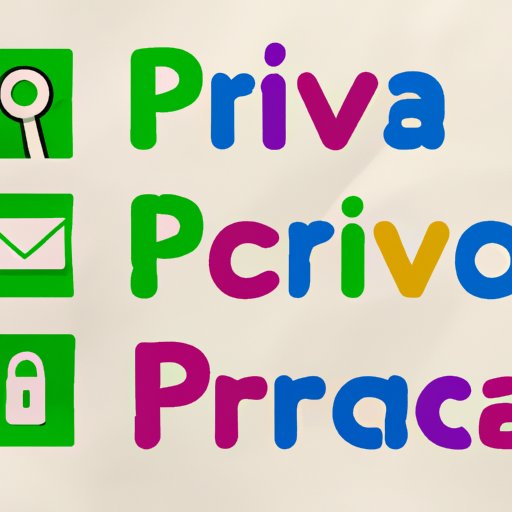
Introduction
Google is undoubtedly one of the most popular search engines in the world today. It has become an indispensable tool for accessing information about virtually anything on the internet. However, as you use Google, the search engine collects information about your search activities which can put your privacy at risk.
The purpose of this article is to provide you with a guide on how to delete your Google searches, protect your privacy, and improve your mental wellbeing. We will explore different ways of deleting your search history, tips for managing your privacy settings, and other ways to clean up your digital footprint.
The Simple Guide to Deleting Your Google Search History
If you’re concerned about protecting your privacy and want to remove your Google search history, there are simple steps you can take to do it from your phone or computer.
Here’s how:
- Go to the Google homepage and click on your profile picture
- Click on “Manage Your Google Account”
- Select “Data and Personalization”
- Go to “Activity and timeline” and click on “My Activity”
- Click on the “Three-dot” menu beside the search query you want to delete and click “Delete”
Alternatively, you can delete all the searches at once:
- Go to “Activity and timeline”
- Click on “Delete activity by”
- Choose “All Time” on the drop-down menu
- Click on “Delete”
Deleting your search history is just one step in protecting your privacy. For better security, you should also remove any saved passwords, autofill information, and clear your cache and cookies regularly.
How to Use Google’s New Auto-Delete Feature
Recently, Google introduced a new “Auto-Delete” feature that allows you to set a specific time for your search history to be deleted automatically.
Here’s how to use it:
- Go to “Activity and timeline”
- Click on “Choose to delete automatically”
- Choose how long you want to keep your activity before it’s deleted
- Click on “Next”
- Click on “Confirm”
With this feature, your search history will be automatically deleted without you having to worry about doing it yourself regularly.
Moreover, using the auto-delete feature also provides some degree of protection against breaches and hacks. The longer your data stays on your device, the more vulnerable it is to security and privacy attacks. Therefore, setting your data to auto-delete is an excellent way to maintain privacy.

The Ultimate Guide to Protecting Your Privacy on Google
Aside from deleting your search history, taking control of your privacy settings is another critical step in protecting your privacy on Google.
Here’s how to set up your privacy settings:
- Go to “Activity and timeline”
- Click on “Manage your Google activity”
- On the left side, select “Privacy and Personalization”
- Choose “Activity controls”
- Disable any activity you don’t want Google to record
Other tips for protecting your data on Google include using a VPN, enabling two-factor authentication, and not giving out excessive information when filling out forms.
The Myth of Private Browsing: Why You Need to Delete Your Google Search History
Many people believe that using the private browsing feature on their browser will protect their privacy. However, this isn’t entirely true. Even with private browsing mode, your search history is still saved, and ISPs and websites can track your search behaviors.
It’s therefore essential to delete your search history regularly, especially if you’re surfing sensitive topics that may compromise your privacy.
Besides privacy, there are other reasons why it’s necessary to delete your search history. One is to prevent targeted ads. Google tracks your search history to show you relevant ads based on your interest. However, this may compromise your privacy and result in unwanted spam and ads being served to you.
Cleaning Up Your Google Footprint: Why Deleting Your Search History is Just the Beginning
Deleting your search history is just the beginning of managing your online presence. There are other digital traces left behind that can put you at risk, such as social media profiles and cyber activities.
Here are some tips for cleaning up your digital footprint:
- Review and reduce your social media profiles
- Use a different email address for your online activities
- Be mindful of the information you share on public profiles
- Use a password manager and regularly change your passwords
- Use a virtual private network (VPN) to protect your online activities
Your digital footprint is a reflection of your personal brand, so it’s crucial to keep it in check.
Keeping Kids Safe Online: A Guide to Deleting Google Searches on Family Shared Devices
For families that use shared devices, it’s essential to keep your children safe online. Children are naturally curious, and without proper guidance, they may stumble upon inappropriate content online.
Here’s how to delete search history on family shared devices:
- Go to the Google homepage
- Click on your profile picture
- Select “Signed in as XXXX”
- Click on “Manage Your Google Account”
- Select “Data and Personalization”
- Choose “Web and App activity”
- Click “Manage Activity”
- Click on the “Three-dot” menu beside the search query you want to delete and click “Delete”
It’s crucial to educate your children about online safety and regularly monitor their online activities. Employing parental controls, using restricted filters, and setting up child-specific accounts can help further protect your kids from harmful content.
The Digital Detox: How Deleting Your Google Search History Can Improve Your Mental Health
Apart from privacy concerns, too much screen time can also negatively affect your mental wellbeing. By deleting your search history and eventually reducing your online presence, you can take a significant step towards a digital detox and improve your mental wellbeing.
Here are some tips for a holistic approach to digital detoxing:
- Set boundaries on your screen time
- Disconnect from gadgets during mealtimes and social events
- Engage in physical activities like exercises and hikes
- Try meditation and breathing exercises to manage stress
- Practice good sleep hygiene
These tips can go a long way in improving your mental health and wellbeing.
Conclusion
Deleting your search history and protecting your privacy is essential in today’s digital age. Understanding how your data is collected, stored, and used is vital to your safety and security online. This article has provided you with a comprehensive guide on how to delete your Google searches, manage your privacy settings, and keep your children safe online.
Remember always to be mindful of the information you share and the sites you visit. Together, we can take charge of our digital lives and stay safe online.




